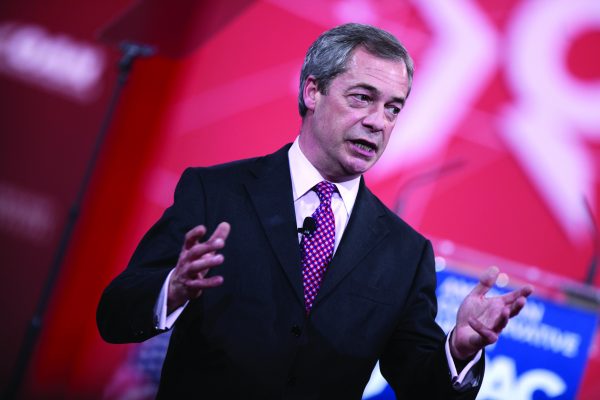Britain Must Go Through With the “Brexit”
As Prime Minister, John Major refused to adopt the Euro as currency. (PHOTO COURTESY OF CHATHAM HOUSE VIA FLICKER )
May 27, 2016
June 23, 2016 will be a turning point in British history. The British are currently embroiled in the single most important political event of this generation, the so-called “Brexit.” Britain will vote by way of a national referendum either to remain a member state of the European Union or to leave it. This referendum is the last hope for democracy in Europe and I fervently hope that Britain grants itself a rightful divorce.
Throughout the years, the European Union has grown spectacularly in size and more importantly, in power. The Single European Act in 1986 spelled out how the European project would grow in the next decade by establishing the much-lauded single market. It is with dreadful irony that they were added, along with a treaty that effectively smashed together now vastly different economies, into one single market. I like to think of it as the economic equivalent of beating incongruous puzzle pieces together with a sledgehammer.
Worse came with the signing of the Maastricht Treaty which established a single currency – the euro. Thankfully, then-Prime Minister John Major and his administration saved both the pound sterling and the British from the worst of future Eurozone crises. What happens when you try to coerce overarching monetary policy with numerous independent fiscal policies (which are not yet within the EU’s complete control)? Nothing good. Interestingly, Major faced many of the same arguments that the pro-Brexit United Kingdom Independence Party (UKIP) leader Nigel Farage faces today in regard to keeping out of Europe. Apparently a mass exodus of business, a disintegration of the British job market and the drying up of foreign direct investment were imminent in those days, too.
The most alarming developments in the power and foolhardiness of the European Union have come in recent years with the signing of the Lisbon Treaty and the expansion of membership to poorer Eastern European countries. These two occurrences have proven that the European Union is an aspiring empire and that the people who run the show do not care the least bit for British citizens.
The consolidation of power that was granted to the European Commission under the Lisbon Treaty has stolen the sovereignty of Britain. Years and thousands of pages of legislation later, 65 percent of the laws that govern the United Kingdom are now passed by the European Parliament in Brussels. The elections for Members of Parliament frankly don’t mean much. A vote for a Member of European Parliament (MEP) unluckily means even less! With 28 member states and counting (the inclusion of Turkey forthcoming), and hundreds of legislators from outside of Britain, a British MEP can do little more than beg to represent his or her constituencies in Brussels.
The first thing to note about the Lisbon Treaty and the inclusion of Eastern Europe in the EU is that Britain does not have control over her own borders and is not free to negotiate her own trade deals with the rest of the world. With the addition of the former Soviet bloc countries that are still devastated by the effects of communism to the European Union, thousands upon thousands of unskilled economic immigrants are arriving to Britain. Instead of being permitted to control and regulate immigration independently, Britain is forced to accept these immigrants even though the country does not have anything close to the infrastructure needed to cope with the sheer quantity of people coming. Instead of accepting highly skilled immigrants from India or other parts of the former Commonwealth, Britain must accept people who (economically speaking) contribute nothing but cheap labor. Britain is equally shackled from sitting at the trading table. It is impossible, under current EU laws, for Britain to negotiate trade deals with non-EU nations. I find it grim that the fifth-largest economy in the world does not have this power that we in the United States take for granted.
What was once a successful economic cooperation between a select few free and independent countries has devolved into a manifestation of totalitarianism and authoritarianism. It is the biggest threat to democracy, freedom and national sovereignty that exists in the world today. It is awash with unelected bureaucrats and moral busybodies who want nothing more than to control every aspect of British life without the consent of the British. Simply by watching Parliamentary proceedings on YouTube, anyone can see that they often behave like schoolyard bullies and rarely take “no” for an answer. I fear for those who would like to give them unrequited power.
Here in the United States, we take national sovereignty and real democracy for granted. I live in the luxury of thought that Americans across the political spectrum will voraciously oppose any slight against our sovereignty. If I proposed that even one percent of our laws be made somewhere else, I would be laughed at and called crazy.
I believe that Britain is good enough to stand on its own in the world and that her best days lie ahead, not behind. A vote to leave is a vote to reinstate Westminster to its former power and influence. A vote to leave is a vote to make the ballot box worth going to.










